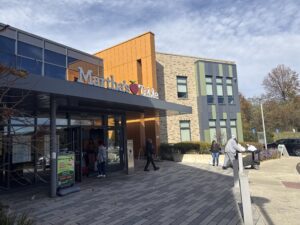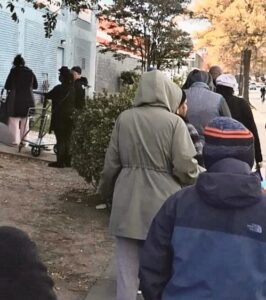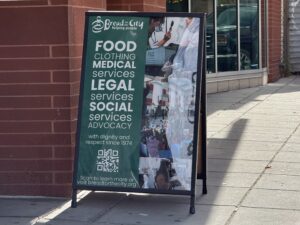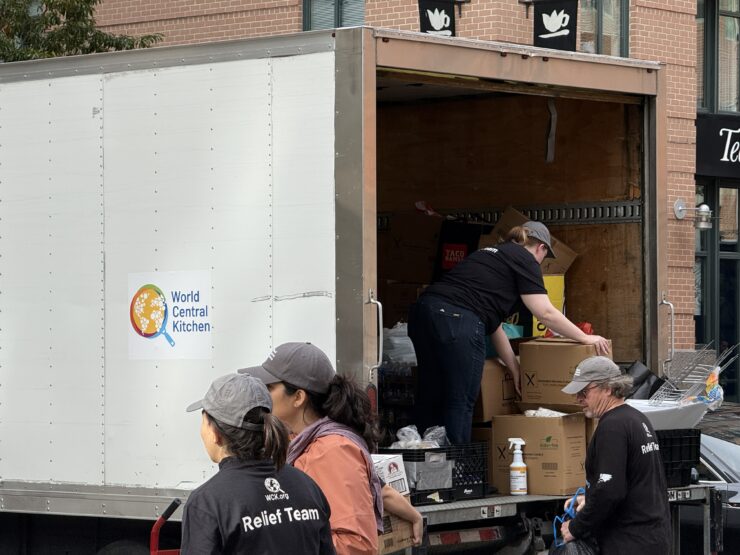As the federal government shutdown rolls into Day 37, the longest in history, confusion and anxiety are growing among vulnerable families trying to navigate critical food assistance known as SNAP.
Washington, D.C., area residents said Wednesday they are less interested in the political battles, and more focused on the potential loss of benefits and what that means for their families.
SNAP, the Supplemental Nutrition Assistance Program, is a government-funded food assistance program designed to support low-income households with children, seniors and people with disabilities; it offsets the cost of nutritious food during economic hardship.
Stress is palpable
More than a million people in the D.C. metro area suffer from food insecurity, according to the Capital Area Food Bank, the largest food distribution center in the region.
Bernice Anderson, a D.C. resident, received her SNAP benefits on Nov. 1, but said the possibility of not receiving them kept her awake for several nights in a row.
Anderson, who has been receiving SNAP benefits for the past six years, said she depends on that help to feed her three children.
“Three kids, bills and all the things,” Anderson said. “We would have no food if we didn’t get stamps.”

Hillary Salmon, senior director of marketing and communications at Capital Area Food Bank, said 430,000 people in the DMV area rely on SNAP benefits, with monthly assistance averaging between $186 and $330 per household. Without the SNAP dollars, Salmon said 80 meals a month are “gone from families’ tables.
“We are trying to fill the gap,” Salmon said. “For every meal that a food bank provides, the SNAP program provides nine. That can get you a sense of how broad the issue is.”
Salmon said Mayor Muriel Bowser’s announcement that the city will fund SNAP through November brought relief. But she said the food bank is still planning for potential impacts from possible delays. In November, Capital Area Food Bank is ramping up to provide a million more meals than previously projected, a 25% increase from the same time last year.
Although residents in the Washington, D.C., area will still receive benefits this month, Salmon said the community’s stress is palpable. Phone calls to the organization’s Hunger Lifeline, which assists those looking for emergency food aid, have tripled over the past three weeks.
In September, the Capital Area Food Bank’s Hunger Report found 36% of residents in the DMV area don’t know where their next meal will come from. Salmon said she suspects the numbers will get worse following recent federal layoffs and the government shutdown.
“We are dealing with many forces acting upon each other,” Salmon said. “A lot of these folks are really experiencing economic strain and a lot of anxiety about what’s going to happen.”

Mixed messages from the feds
Conflicting messages from the federal government on SNAP funding have led some to question whether they will get their benefits in November.
In October, the Department of Agriculture website said SNAP benefits would not continue in November.
“Bottom line, the well has run dry. At this time, there will be no benefits issued on November 1,” the Food and Nutrition web page said at the time.
On Oct 30, Bowser announced that the District will use its own money to cover the cost of food benefits received by Washingtonians under SNAP through November.
On Oct. 31, federal judges ordered the Trump administration to use emergency federal funds to sustain SNAP benefits through the shutdown.
Then, Trump said on a Nov. 4 Truth Social post, SNAP benefits would be held.
On the same day, White House press secretary Karoline Leavitt said that the Trump administration is distributing SNAP benefits.
“The administration is fully complying with the court order,” Leavitt said.
‘Frustration’ and confusion
Behind the shutdown, political banter, confusion and court orders, residents are worried.
Mike, who received food from Bread for the City, an assistance center, and who requested not to use his full name for privacy reasons, said he welcomed Bowser’s decision to authorize the use of local funds to support SNAP.
“Without that help,” Mike said, “I would lose my benefits.”

For Katrina Sanders, a Washington, D.C., resident, the possibility of not receiving her SNAP benefits in November is unimaginable.
Sanders, a mom of four, said a foot injury has kept her from working, and the benefits provide peace of mind for her and her four children.
Scheduled to receive her SNAP benefits on Nov. 8, Sanders said she is relying on different community outreach programs, such as Martha’s Table, a nonprofit service organization, to have access to fresh produce.
“I am going to have to make due with what I have,” Sanders said. “You rely on all these things put in place, and to hear they may not continue to be in place is so frustrating.”
World Central Kitchen helps federal workers
The NGO World Central Kitchen is helping people in need in Washington, mostly federal employees and their families. The government shutdown has affected not only SNAP recipients but also the food security of many federal workers.
“We are feeding people working without pay,” said Laura Hayes, senior manager of the Chef Corps for World Central Kitchen. “They are coming into the office, and we are making sure to take care of them.”
By helping federal workers overcome food insecurity, they are also supporting local restaurants, which have been struggling as fewer federal employees eat out.
Hayes said the group has provided more than 36,000 meals and all of them are purchased from local restaurants.
“We are buying the meals from the local restaurants and then sharing them with furloughed workers,” Hayes said. “So everybody is supported a little bit.”
Salmon said concerns and caution are rampant in the community. But with support from community networks, there is some ease to the tumultuous environment.
“We know there was an existing high level of need in our community even before anything related to the shutdown, and we are working to step in and help provide even more food out into the community,” Salmon said.















[…] government shutdown has disrupted SNAP, formerly known as food stamps, which was expected to be paused this […]